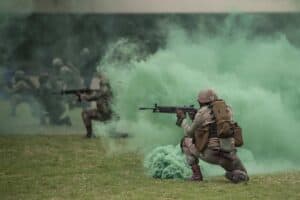Unless Ramaphosa acts soon, the radical economic transformation forces will be emboldened enough to act against him.

The main reason for President Cyril Ramaphosa’s continued high levels of public support, considerably beyond the electoral popularity of his party, is fear.
Fear that his departure would mean that the state capture faction – cloaked under the radical economic transformation (RET) label – would regain control, with all the attendant ghastly implications. In other words, there will be a complete and utter Zimbabwe-style meltdown. In other words, exactly what is already happening.
Given Ramaphosa’s manifest inability to act decisively, all that’s at issue here is the speed at which the disaster unfolds. The president cannot make the economic changes that are necessary because he dare not defy the union movement and SACP. He cannot act effectively against corruption since the entire party appears to be implicated in it.
As ANC secretary-general Ace Magashule put it in response to public outrage over vastly inflated Covid emergency health relief tenders going to the politically connected: “Tell me of one leader of the ANC who has not done business with government?” It’s an astonishingly provocative response.
He is basically saying Ramaphosa is just the latest in a long line of presidents who are corrupt. Ramaphosa has neither denied such culpability, nor has he taken any disciplinary action against Magashule. One must then conclude that either Ramaphosa is as ethically challenged as are so many of his colleagues, or that he cannot, or will not, rock the party boat. Since there has been no evidence of Ramaphosa being a crook, the problem is one of presidential paralysis.
For Ramaphosa, “cannot” and “will not” are the same thing. As he has repeatedly said, the most important thing for him is not to preside over the break-up of the party. And his avowedly reformist faction has still not been able to wrest control from former president Jacob Zuma’s RET cronies.
On the contrary, judging by the recent behaviour of Minister Nkosazana Dlamini-Zuma, his stature and options within the party have diminished. While Ramaphosa has wafted about during the past months trying to look in control, Dlamini-Zuma is the one who behaved as though she were, in fact, in charge.
Most humiliatingly, Dlamini-Zuma peremptorily countermanded his lifting of the ban on smoking, exposing him to public derision.
Similarly, Police Minister Bheki Cele has rampaged through the lockdown months like a spaghetti Western baddie. Yet Ramaphosa has not spoken a word in rebuke. Since he is unlikely to change, we depend on events to force change. A split in the ANC would do exactly that.
An ANC split down the middle, now, would likely lead to the RET forces, led by Dlamini-Zuma, making common cause with the EFF. That would conceivably lead to a far-left coalition forming the next government. But, equally, it could see the Ramaphosa reformists in the ANC aligning – or supplanting – the DA and formations such as those of Herman Mashaba and Mmusi Maimane. Such speculation is of limited use.
The point is simply that the economic and social pressures, aggravated by the pandemic, are enormous. Something has to give. Ramaphosa is getting weaker within the tripartite administration, not stronger. Unless he acts soon, the RET forces will be emboldened enough to act against him
William Saunderson-Meyer.
For more news your way, download The Citizen’s app for iOS and Android.
Support Local Journalism
Add The Citizen as a Preferred Source on Google and follow us on Google News to see more of our trusted reporting in Google News and Top Stories.








